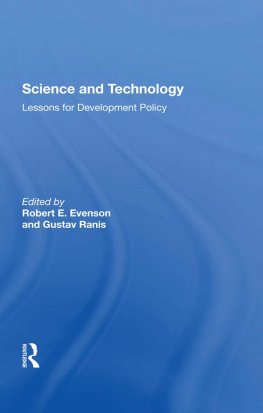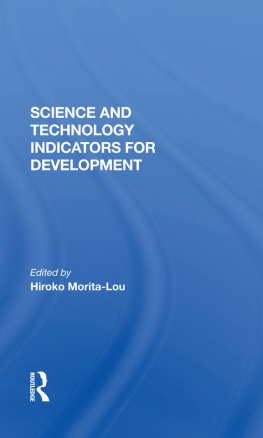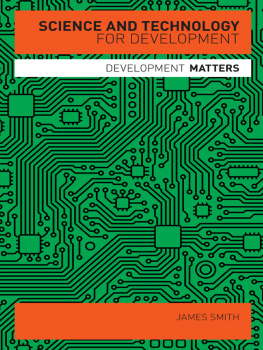Science and Technology
Lessons for Development Policy
Published in cooperation with the Economic Growth Center, Yale University
First published 1990 by Westview Press
Published 2019 by Routledge
52 Vanderbilt Avenue, New York, NY 10017
2 Park Square, Milton Park, Abingdon, Oxon OX14 4RN
Routledge is an imprint of the Taylor & Francis Group, an informa business
Copyright 1990 Taylor & Francis
All rights reserved. No part of this book may be reprinted or reproduced or utilised in any form or by any electronic, mechanical, or other means, now known or hereafter invented, including photocopying and recording, or in any information storage or retrieval system, without permission in writing from the publishers.
Notice:
Product or corporate names may be trademarks or registered trademarks, and are used only for identification and explanation without intent to infringe.
Library of Congress Cataloging-in-Publication Data
Science and technology : lessons for development policy / edited by
Robert E. Evenson and Gustav Ranis.
p. cm.
Includes bibliographical references.
1. Science and stateDeveloping countries. 2. Technology and
stateDeveloping countries. I. Evenson, Robert E. (Robert
Eugene), 1934 . II. Ranis, Gustav.
Q121.2.S385 1990
338.926091724dc20
89-77557
CIP
ISBN 13: 978-0-367-28665-1 (hbk)
Contents
, Robert E. Evenson and Gustav Ranis
, Charles Weiss, Jr.
, Moshe Justman and Morris Teubal
, Richard R. Nelson
, Larry E. Westphal, Kopr Kritayakirana, Kosal Petchsuwan, Harit Sutabutr, and Yongyuth Yuthavong
, Nathan Rosenberg
, Gustav Ranis
, Carl E. Pray and Vernon W. Ruttan
, Howard Pack
, Anil B. Deolalikar and Robert E. Evenson
, Raymond Vemon
, Robert E. Lipsey, Magnus Blomstrm, and Irving B. Kravis
, Frances Stewart
, Robert E. Evenson
The papers in this volume were commissioned by the Economic Growth Center of Yale University under the direction of the editors supported by a grant from the United States Agency for International Development, which we gratefully acknowledge. Donald Sillers and Norman Nicholson of the Asia Bureau of AID were particularly helpful in planning the seminar and providing for government participation.
We also wish to thank M. Ann Judd of the Economic Growth Center, who was responsible for final editing of the papers. Glena Ames and Leila Adams provided typing and secretarial assistance, and Dorothy Nitshke, the Growth Centers Business Manager, provided administrative support.
Robert E. Evenson
Gustav Ranis
Part I
Introduction
1
Introduction
Robert E. Evenson and Gustav Ranis
Hardly anyone today fails to recognize the importance of the impact of both technology choice and technology change on growth as well as on the employment and income distribution and other important dimensions of development. Both the academic and policy-making world recognize the wide range of options faced by entrepreneurs, public and private, in the Third World with respect to both the static process and product attribute choices as well as the dynamic direction for technology change, i.e., the alteration of easting choices in both the process and product dimensions. The recognition of the overwhelming importance of this dimension of development relative to the more conventional inputs of capital, labor and land renders science and technology policy a most vital area for further research as well as action.
The analytical uncertainties that impede constructive policy more than anything else reside in two dimensions: die first is the absence of recognition that there is a need for differential roles to be assumed by both technology choice and change at different stages of a countrys development; the second is the fact that the relationship among science, technology and development is much more complicated than we had imagined (i.e., the recognition that the causal relationship does not always run in the familiar uni-modal direction). Moreover, there is a great deal of related uncertainty about how much of an LDCs technology can be or should be home-grown, imported and transplanted, and/or imported and adapted. There exists an even greater amount of unease with respect to the volume of human and financial resources that developing countries should commit to basic science as the underpinning for technology change, in the knowledge that the ticket of admission to the community of science carries a rather steep price tag.
However, the good news that emerges clearly from the papers presented in this volume is that most developing countries are typically operating way inside what might be called their technology opportunity frontier with respect to both technology choice and the direction of new technological effort. Therefore, there exists a substantial potential for enhancing the productivity of the scarce available physical resources by more effectively enlisting the catalytic impact of this black box conveniently labeled science and technology.
Section II of this volume presents several general theoretical notions about the process of science and technology as it relates to development, while Section III brings some relevant experience, both contemporary and historical, to bear on issues confronting todays developing countries. Section IV is focussed on specific experiences in agriculture and in several industries. The final section (V) develops the international dimension of science and technology both in terms of the international exchange processes and of the appropriateness and modification of technology as it is exchanged and transferred internationally.
If there is one thing most observers are agreed on, it is that the human capacity in the developing countries to choose wisely from among technologies available outside and, more importantly, to make wise adaptations in consonance with the local environment is the single most important dimension differentiating success from failure. Charles Weisss paper, for instance, focuses on a proposed stages theory characterized by different levels of scientific and technological capability. Whether or not his particular schema of historical progression is appealing is a secondary matter; what is important is that the changing base of human resources as well as the changing technological and scientific infrastructure as created by human action can make a substantial difference as a country undergoes its attempted transition to modern economic growth.
Weisss phases are reminiscent of the development schema of an earlier era in which one first encounters an import substitution phase that is characterized by the scarcity of highly skilled human capacity with the brute act of saving or accumulation necessarily taking precedence over the efficiency of the process. During this first phase, there exists little institutional or manpower capacity, either within the basic educational system or among the public at large. In the second phase, usually characterized as export oriented, it becomes much more crucial to enhance technological capability in all its dimensions because it is now necessary to compete in international markets in terms of both the quality of the product and its price. In short, there is no longer a captive audience of domestic consumers to be relied upon.










